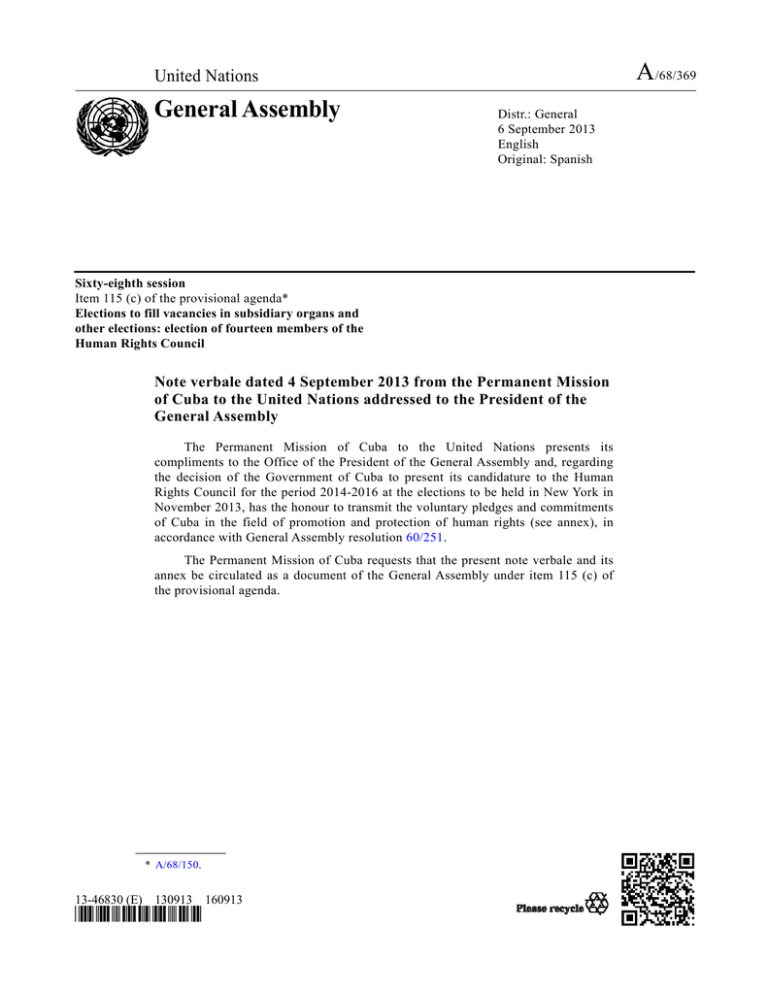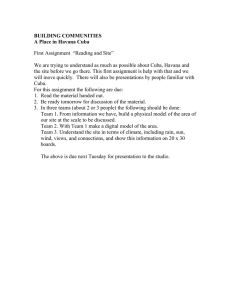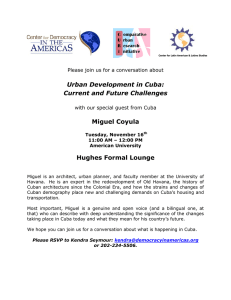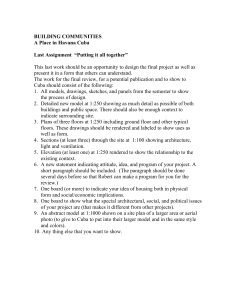A General Assembly United Nations
advertisement

A/68/369 United Nations General Assembly Distr.: General 6 September 2013 English Original: Spanish Sixty-eighth session Item 115 (c) of the provisional agenda* Elections to fill vacancies in subsidiary organs and other elections: election of fourteen members of the Human Rights Council Note verbale dated 4 September 2013 from the Permanent Mission of Cuba to the United Nations addressed to the President of the General Assembly The Permanent Mission of Cuba to the United Nations presents its compliments to the Office of the President of the General Assembly and, regarding the decision of the Government of Cuba to present its candidature to the Human Rights Council for the period 2014-2016 at the elections to be held in New York in November 2013, has the honour to transmit the voluntary pledges and commitments of Cuba in the field of promotion and protection of human rights (see annex), in accordance with General Assembly resolution 60/251. The Permanent Mission of Cuba requests that the present note verbale and its annex be circulated as a document of the General Assembly under item 115 (c) of the provisional agenda. * A/68/150. 13-46830 (E) 130913 160913 *1346830* A/68/369 Annex to the note verbale dated 4 September 2013 from the Permanent Mission of Cuba to the United Nations addressed to the President of the General Assembly Candidature of Cuba to the Human Rights Council, 2014-2016 Voluntary pledges and commitments pursuant to General Assembly resolution 60/251 1. Cuba attaches the greatest importance to international cooperation for the promotion and protection of human rights within the United Nations and, to that end, aspires to be elected as a member of the Human Rights Council. 2. Cuba participated actively and constructively in the negotiations that led to the establishment, institution-building and review of the Human Rights Council. The Cuban delegation submitted various proposals designed to ensure that the Council would serve as a forum for genuine dialogue and international cooperation on human rights, and to prevent its work from becoming tainted by the harmful practices of confrontation and political manipulation that put paid to the very existence of the Commission on Human Rights. 3. Cuba remains committed to promoting consideration of the just historical demands of the peoples of the South and of the large majority worldwide on issues such as the right to food; effective realization of the right to development; combating racism, racial discrimination, xenophobia and related intolerance; ensuring full respect for the principles of universality, indivisibility, objectivity and non-selectivity in strengthening cooperation on human rights matters; and promoting the right to peace; cultural rights, including respect for cultural diversity; and the right to international solidarity and to a just, democratic and equitable international order, pursuant to article 28 of the Universal Declaration of Human Rights. Cuba will continue to increase the attention paid to these just demands of individuals and peoples in its capacity as the main sponsor of some 10 draft resolutions in the Human Rights Council. 4. Cuba reaffirms its readiness to continue working tirelessly to achieve the shared goal of enabling all individuals and peoples throughout the world to enjoy all human rights, on the basis of respect for the Charter of the United Nations, the internationally agreed human rights instruments and the Vienna Declaration and Programme of Action. Cuba reiterates its commitment to international cooperation in the promotion and protection of human rights. 5. In May 2006, Cuba was elected as a founding member of the Human Rights Council for the period 2006-2009. In 2009, it was re-elected for the period 20092012. 6. Cuba has fulfilled its commitment to the universal periodic review mechanism and successfully presented its first and second national reports in February 2009 and May 2013 respectively. Cuba reaffirms its commitment to continue strengthening this mechanism and will work to consolidate the cooperation approach that inspired its establishment. At the same time, Cuba remains committed to addressing and implementing the recommendations which it accepted under that process and will work tirelessly to that end. 2/5 13-46830 A/68/369 7. Cuba is a State party to most of the international human rights instruments and a signatory to many others, and it has fulfilled its periodic reporting obligations to the bodies established to monitor compliance. Cuba will continue working to fulfil its international human rights obligations. 8. Cuba has a long record of international cooperation in the area of human rights, demonstrating through concrete actions its unequivocal willingness to engage in frank and open dialogue. Cuba is a State party to most of the main international human rights instruments and a signatory to many others. 9. Cuba cooperates systematically with the special procedures of the Human Rights Council and responds in a timely manner to their requests for information. Cuba has been visited by several of these mandate holders. Cuba will continue to cooperate with all procedures of a universal nature established by the Council. 10. Cuba maintains ongoing cooperation with the Office of the United Nations High Commissioner for Human Rights and remains committed to working constructively to ensure equitable geographical representation in the Office’s staffing. Cuba was one of the first countries to be visited by the High Commissioner for Human Rights, barely a year after that post was established. Cuba will continue to cooperate on strengthening the capacity of the Office of the United Nations High Commissioner for Human Rights to carry out its mandate. 11. Cuban women and men have made significant progress in the enjoyment of all their human rights, overcoming major obstacles and threats posed by the unilateral embargo policy and hostility that they face. Their achievements range from economic, social and cultural rights to civil and political rights, as well as the realization of so-called third-generation or solidarity rights. 12. In Cuba, equality and non-discrimination are fully guaranteed. Outstanding progress has been made with regard to gender issues. The Cuban Government continues to implement numerous laws, policies and programmes in order to strengthen those gains. Institutional racism has been eradicated, the most disadvantaged groups have been provided with ample opportunities for selfimprovement and with real benefits, and every effort is being made to ensure full and effective equality of opportunity for historically disadvantaged groups and dysfunctional families. Cuba remains determined to step up the fight against racism, racial discrimination and all forms of discrimination on any grounds as a matter of priority for the international agenda and human rights cooperation. Cuba will continue to promote the rights of women, children, young people, and individuals of all ages, including older persons, those with disabilities, migrants, indigenous peoples and minorities, and will combat scourges such as poverty, the trafficking and smuggling of persons and terrorism, among others, while consistently upholding respect for internationally agreed rules and standards. 13. Cuba’s important achievements in such areas as health, education, scientific and technical research, culture and sports are well known. However, what has been hidden or distorted is the fact that all this has been possible precisely because the Cuban people are the masters of their political fate and the country’s resources, exercise the fullest power and control over the life of the nation, and participate actively in the effective system of democracy that they designed and approved in a universal plebiscite. 13-46830 3/5 A/68/369 14. Many of the peoples of the world share the high ethical standards and noble principles of selfless solidarity that guide the conduct of the Cuban people in their international activities. Tens of thousands of Cubans shared the fate of millions of their brothers and sisters in the struggles against colonialism and apartheid. Today, there are more than 50,000 Cuban cooperation workers in the remotest villages, mountains and hard-to-reach places in more than 100 nations, sharing Cuba’s achievements in the fields of health care and education with those peoples. Cuba remains committed to international cooperation, sharing its modest resources according to its means. 15. Cuba hopes to join the Council as a country where no one is unprotected or deprived of dignity, where all children have a quality education, the sick have the best medical care and the elderly have social protection; a country where the rights of all workers, farmers, intellectuals and students are protected by law; a place where citizens are safe, without organized crime or drugs. Cuba seeks to join the Council as a united people, with deep social cohesion; a country where no one has been extrajudicially executed, tortured or disappeared, where there are no kidnappings or secret prisons. Cuba remains committed to international cooperation for the promotion of justice, equity, democracy and all human rights for all, including the rights to peace and development, both nationally and internationally. 16. There have been important economic and social changes in Cuba. Progress has been made in improving State institutions and in furthering citizen participation and control as the foundation of our democracy, and efforts are ongoing to achieve sustainable development with social justice. 17. One development of great significance was the adoption by the National Assembly of the People’s Power of the Social and Economic Policy Guidelines, which are a set of decisions needed to update the Cuban social and economic model and a Government programme. Cuba remains committed to its irrevocable decision to advance its socialist, indigenous, innovative, democratic and fully inclusive development. 18. The aforementioned Guidelines were adopted after a very wide public debate in which millions of Cubans, with complete freedom, made more than 400,000 amendments, changing two thirds of the draft, and voted on each of its 12 chapters. It was an unusual exercise in consulting citizens directly in order to achieve a consensus on the Government’s economic, monetary and social policies and measures to overcome the effects of the global economic crisis and Cuba’s economic problems without resorting to neo-liberal remedies or shock policies. 19. New regulations have been adopted to expand the legislative basis for human rights, including, inter alia, those related to social security, housing, employment and self-employment, and granting land in usufruct. In addition, progress is being made in improving and updating the country’s legal system by implementing a set of changes that address the needs of Cuban society and meet the highest international standards in this area. These include amendments to the Migration Act, which have had a huge impact and improved relations between Cuba and its emigrants, despite the constant political manipulation of the question of migration. Cuba will continue to strengthen the democratic nature of its institutions, with popular and inclusive laws, policies and programmes, in accordance with the aspirations of its people. 4/5 13-46830 A/68/369 20. The legal system to protect human rights in Cuba is not limited to the provisions set out in the Constitution. It is properly developed and implemented through other substantive and procedural regulations in force, in line with the rights recognized under the Universal Declaration of Human Rights and other international human rights instruments. 21. The rights to life, liberty and security of person are based on the principle of respect for human dignity, and form the basis for the actions of the Cuban authorities and for the functioning of society as a whole. 22. The Cuban prison system is based on the principle of human betterment. Cuba complies with the Standard Minimum Rules for the Treatment of Prisoners and emphasizes a preventive approach based on numerous social programmes, including those that seek to turn prisons into education centres. 23. Cuba remains unequivocally willing to engage in dialogue on all issues and with all States, based on mutual respect, sovereign equality and recognition of the right of peoples to self-determination. 24. Cuba will continue to contribute in a decisive manner to consolidating an approach based on cooperation and constructive dialogue in the work of the United Nations human rights machinery; it is therefore essential to combat any attempts at political manipulation of the work of the Human Rights Council. 25. Should it be elected, Cuba will endeavour to live up to the requirements of the mandate conferred by the States Members of the United Nations General Assembly. 13-46830 5/5



